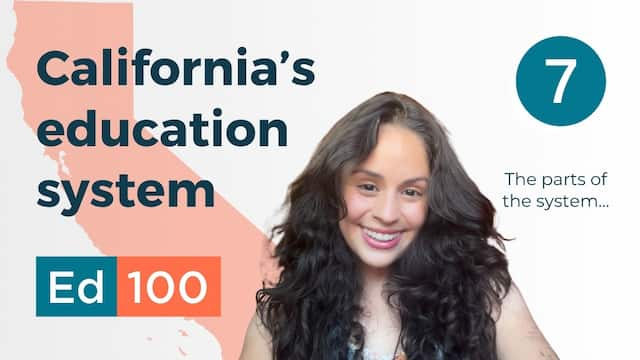
Education policy is complicated, and it changes over time. Who influences those changes? This lesson summarizes major organizations that play a consistent role in informing the public and influencing the policymaking process in California.
In This Lesson

What nonprofits are key players in California education?
Why is uncertain funding powerful?
What is the LAO?
How do legislators get facts?
What are interest organizations?
Which education organizations have lobbyists?
What foundations and philanthropies influence California?
What media sources cover California education?
Which foundations support California's education system?
▶ Watch the video summary
★ Discussion Guide
As explained in earlier lessons in this chapter, the education system is structured in layers, with power distributed among local, county, state and Federal elements.
At every layer, influence is personal. Most public school communities are represented by one school board member, one county school board member, one assemblymember, one state senator, and one member of US Congress. The individuals who serve in these temporary positions of responsibility are barraged with input, only a fraction of it policy-related.
The voices that influence policy decisions include interest organizations, researchers, philanthropies, journalists and regular folks who take the time to use their voice. This lesson reviews some of them.
Non-profit organizations
The education system relies deeply on informed people. Here are a few of the free sources, including Ed100.org, that help people understand education policy issues and make a difference:
|
Non-profit information sources relevant to education |
|
|---|---|
Ed100 explains California's education system plainly, in English and Spanish, with a structure to help build informed communities intentionally. Not news-focused. Weekly email. Blog. It's all free. |
|
EdSource reports daily on education-related research, policy, and political developments that affect California. Free and widely read, it is the daily news source of record for education in California, with a well-edited weekly 20-minute podcast. |
|
California online news site that includes coverage and analysis of education issues. Free, frequent and widely read. |
|
Provides non-partisan, fact-based news about education and education policy. Free. |
|
Policy Analysis for California Education (PACE) |
Synthesizes policy options and research findings about education in California. Free. |
Public Policy Institute of California (PPIC) |
Equips policymakers with public opinion polling on topics including education. Free. |
Insightful articles on parenting and education, tailored to specific grade levels. And a podcast. Oh, and it also has superb tools to compare schools and choose one for your child. Free. |
|
The Referee: The LAO

The California LAO, metaphorically
If there were an official referee in the chaos of education policymaking, it would be the nonpartisan Legislative Analyst's Office (LAO). The LAO's small team serves for California a role similar to the US Congressional Budget Office — it advises the legislature at the legislature's request. Its voice is quiet, but authoritative. LAO reports, though technical, are surprisingly readable — after all, they need to make sense to legislators and their staff, who aren’t always policy experts. When a policy question erupts with controversy, the LAO's site is a good place to look for a cool-headed presentation of the facts.
Government sources
The state of California has a role to play in this information flow.
|
Government information sources |
|
|---|---|
California Department of Education (CDE) |
The official source of lists, laws, regulations and more, written to be precise and technically correct, though not necessarily timely or easy to understand. Free. |
County Offices of Education (COEs) |
The legislature sometimes grants money to or through county offices of education to help explain programs. Free when it exists. |
Paid media sources
In days of yore, newspapers were important players in education policy because they were widely read. Today, there are still some incredible journalists reporting on education issues. Some of them work for paid sources that support important research and reporting. Ed100 links to paywall-protected resources sparingly because we know that few of our readers will spend the money. Below are a few worth mentioning:
|
Noteworthy education news and information sources with paywalls |
|
|---|---|
A widely-read weekly national news periodical for education sector insiders. |
|
Frequent coverage of news and issues for the education sector with a focus on national stories and a general audience. |
|
Frequent coverage of news and issues for the education sector with a focus on California stories written for a general audience. |
|
Frequent coverage of news and issues for the education sector with a focus on California stories, policies and politics. |
|
Covers local education news and issues in central California. |
|
Money, and the strange power of uncertainty
The education system involves a lot of money, as we will discuss in Ed100 Chapter 8, almost all of it to pay for teachers and staff. The major funding systems for education are inflexible. Almost all of the money flows on the basis of rules that voters engraved into the state Constitution by passing initiatives. Between Proposition 13, Proposition 98, and the Local Control Funding Formula (LCFF), the major rules are more or less set in stone, or at least in ink.
Funding for education can vary significantly from year to year, but mostly because of changes in economic conditions, not so much based on things you can control. (More simply: "You get what you get, and you don't get upset!") Except in years when the stock market soars, there really isn't much discretionary money in the system.
Compared to total expenditures, the dollars that philanthropists donate to education are tiny. They are influential because they are uncertain.
Like the reliable son in the parable of the prodigal son, "normal" funding can be taken for granted. Because the dollars are reliable, they are uninteresting.
Advocacy organizations, philanthropies and think tanks can have influence in education systems in part because they aren't reliable. They can bring outside funding, attention, and talent to projects that can't or won't be prioritized through normal channels. The amount of money involved is tiny in context. Even the Gates Foundation accounts for a tiny speck of the total expenditures for education each year. Like the prodigal son, these funders are not dependable. Their favor cannot be taken for granted. It comes with strings and must be earned.
Uncertain dollars motivate action exactly because they are uncertain. Action is necessary to get them.
Interest Organizations
Much of what you will read, hear or see about education is produced by people with a specific point of view. By far the most influential organization in education policy is the California Teachers Association (CTA). Most of its roughtly 300,000 members pay hundreds of dollars in annual membership dues. As California's largest teachers union, it has the resources to communicate its position in ways no other organization can match. (See data from Open Secrets.)
The California State PTA (CAPTA) has no such war chest, but it plays a unique role in education advocacy because of its involvement in a significant fraction of California's public school communities. Each local PTA is its own non-profit organization; in order to be affiliated with PTA, it must meet specific conditions and pay a small amount of dues to support the regional and state PTA organizations. As part of PTA’s mission “to secure adequate laws for the care and protection of children and youth,” their volunteers monitor legislation in Sacramento and in local communities, provide legislative training for volunteers throughout California, and work to identify areas where additional legislation for children is needed. (Ed100.org works with PTA organizations frequently.)
Additional Selected Organizations | |
|---|---|
ACSA | The Association of California School Administrators (ACSA) represents school principals and district leaders. |
CSBA | The California School Boards Association (CSBA) represents the interests of school boards and their members. Their blog, updated daily on an ancient, non-secure platform, provides technical information about issues of the moment. |
SSC | School Services of California (SSC) is a consulting company that advises school districts, especially in budget and legal issues. It shares some useful content for free. |
CFT | The California Federation of Teachers (CFT) is California's second-largest teachers union related to K-12 education. Many in higher education are members. |
CSEA | The California School Employees Association (CSEA) represents non-teachers working in schools. |
CCSA | The California Charter Schools Association (CCSA) advocates on behalf of students, teachers and families in charter schools. |
CCSESA | The California County Superintendents Educational Services Association (CCSESA, pronounced see-sessa) helps unify the perspective of the state's 58 counties regarding education. |
CABE | The California Association for Bilingual Education (CABE, pronounced kah-beh) promotes biliteracy and multicultural competency. |
CASC | The California Association of School Counselors (CASC) advocates on behalf of school counselors. |
CASP | The California Association of School Psychologistss (CASP) advocates on behalf of school psychologists. |
CASC | The California Association of Student Councils (CASC) connects, prepares and advocates for student leaders. |
AASA | The School Superintendents Association (AASA) represents the executives who lead school districts. |
EdVoice | EdVoice provides training on education issues to staffers in Sacramento. The organization is active in advocacy for charter schools. |
Children Now |
Children Now advocates for the policy interests of children. Part of their work includes lobbying, unifying the voice of many non-profits for a Children's Movement. |
CalTog |
Californians Together advocates on behalf of English learners. |
EdTrust-West |
EdTrust-West advocates for equity in California education. |
FIS |
Families in Schools aupports family engagement in education. Advocates for the interests of English learners. |
GENup |
GENup is a student-led organization that organizes students to advocate for the interests of students in high school and college. In 2024 the student founder was awarded a |
Obviously, this list is not exhaustive - please add your comments to call attention to others!
Many of the organizations above are "in the room" when education policy is being written in Sacramento. These interest organizations help overworked legislative staff by providing specific wording suggestions for bills and regulations. Some hire a registered lobbyist, but most don't.
Foundations
Most education-related philanthropic dollars are spent on things like scholarships or to support the operational costs of schools or programs. But a small, fragile portion supports organizations that equip school systems to tackle systemic change. Many of the organizations listed above are dependent on these foundations.
|
Foundations for systemic change in education |
|
|---|---|
The William and Flora Hewlett Foundation awarded about $54 million in 2023 to education-related grantees, with a focus on innovation in instruction. Part of their strategy is to improve the quality and availability of low-cost Open Education Resources (OER), which can free up funding for teachers and programs. Decades ago, crucial support from the Hewlett foundation set the stage for California's innovative Local Control Funding Formula. |
|
The Bill and Melinda Gates Foundation has spent billions over decades to develop, research, and test education reform ideas, some very influential. For example, the foundation's support for stronger teacher evaluations led to changes in many states. Historically, the foundation has also supported small schools, charter schools, education data, and innovation in education technology. |
|
The William and Flora Stuart Foundation has long worked on issues confronting young people in California, with special focus on foster youth. The Foundation has been particularly involved in helping to develop systems that make sense. It was one of the first funders of Ed100, and it provides critically important support to EdSource. |
|
The California Endowment is a large grantmaking organization with a major focus on health, but it occasionally supports projects that relate to education. For example, the California Endowment helped shed light on disproportionately harsh school punishments dealt to African American and Hispanic youth. This work led to a re-examination of zero-tolerance policies in local districts and at the state level. |
|
Organizations that fund the intellectual infrastructure of the education system are unfortunately rare. Ed100 would not exist without the resources and counsel provided by the Kabcenell Foundation and the Stuart Foundation.
And of course this post omits a lot. A national organization called Grantmakers for Education convenes and trains philanthropic leaders; their conferences provide helpful insight into which causes these essential organizations might focus on next.
The next lesson looks at the changing landscape of school accountability.
This page was updated November 2024<
Quiz×
CHAPTER 7:
And a System…
-
And a System…
Overview of Chapter 7 -
The Role of State Government in Education
California’s Constitutional Responsibility -
The Federal Government and Education
Small money, Big Influence -
School Districts in California
What do School Districts Do? -
County Offices of Education
Oversight and Regional Services -
Teachers' Unions in California
What do Teacher Unions Do? -
Ballot Initiatives and Education
California's Initiative Process and How It Affects Schools -
Who Influences Education?
Politics, Philanthropy and Policy -
Accountability in Education
Who Monitors the Quality of Schools? -
What to Do with Failing Schools
Interventions and Consequences in California -
The LCAP
Annual Plans for California School Districts
Related
- There are no related lessons.
Sharing is caring!
Password Reset
Search all lesson and blog content here.
Login with Email
We will send your Login Link to your email
address. Click on the link and you will be
logged into Ed100. No more passwords to
remember!














Questions & Comments
To comment or reply, please sign in .
Do2na September 12, 2023 at 2:51 pm
Shamrock27 May 7, 2020 at 2:20 am
Sonya Hendren September 13, 2018 at 6:48 pm
Caryn September 13, 2018 at 7:42 pm
Jeff Camp May 4, 2017 at 7:54 am
GSG April 23, 2015 at 1:58 pm
g4joer6 April 21, 2015 at 5:41 pm
Jeff Camp - Founder April 21, 2015 at 9:51 pm